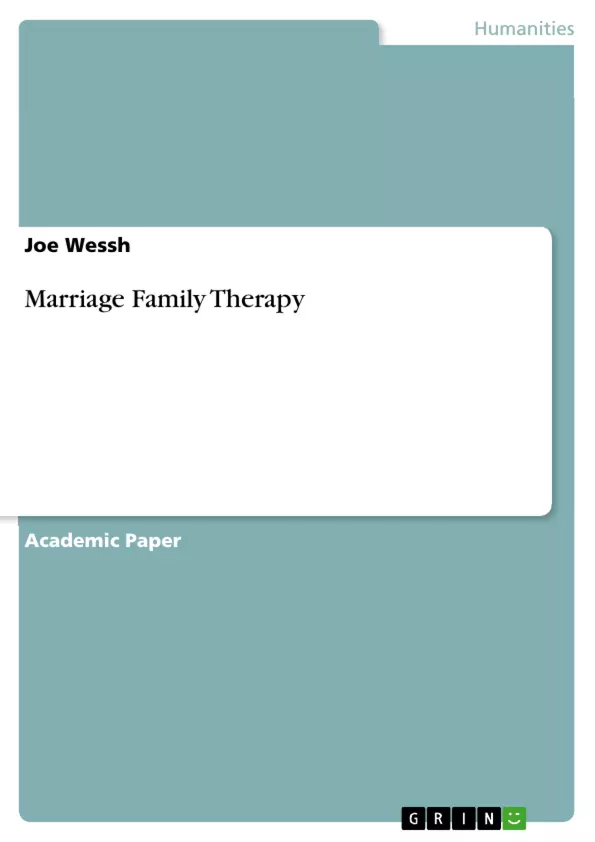During therapy, the expectations play a significant role as far as the client change is concerned. The therapist is expected to understand the clients appropriately to enable personalized and effective care as well as positive outcomes at the end of the therapy. The marriage and family therapy, specifically Marital Satisfaction Inventory-Revised (MSI-R), involves a lot of information sharing as regards to the couples, their families, and their relationship. It is expected that the therapist would ask a wide range of questions concerning the current challenges facing the clients and the objectives of carrying out the therapy.
Inhaltsverzeichnis (Table of Contents)
- Part 1
- Part 2
Zielsetzung und Themenschwerpunkte (Objectives and Key Themes)
This text explores the application of assessment in marriage and family therapy, particularly focusing on the Marital Satisfaction Inventory-Revised (MSI-R). It aims to provide insights into the complexities and considerations involved in using this assessment tool for successful interventions.
- The role of therapist expectations and client change in marriage and family therapy
- The importance of cultural sensitivity and cultural considerations in assessment
- The impact of client involvement and the need for cautious facilitation
- Ethical considerations in administering the MSI-R, including privacy, non-judgmental approach, and the importance of client autonomy
- The relevance and applicability of assessment in marriage and family therapy for clinical practice and research
Zusammenfassung der Kapitel (Chapter Summaries)
This preview only contains information from Part 1 of the text. Part 2 is not included to avoid spoilers.
Part 1 explores the expectations surrounding marriage and family therapy, emphasizing the therapist's role in understanding clients, their relationships, and their cultural contexts. It highlights the complexities of assessing family dynamics, the importance of navigating cultural differences, and the need for a non-judgmental approach while encouraging client involvement. The chapter also touches upon ethical considerations related to privacy, confidentiality, and respecting client autonomy.
Schlüsselwörter (Keywords)
Key terms and concepts explored in this text include marriage and family therapy, assessment, Marital Satisfaction Inventory-Revised (MSI-R), cultural sensitivity, client involvement, ethical considerations, client change, and intervention.
Frequently Asked Questions
What is the Marital Satisfaction Inventory-Revised (MSI-R)?
The MSI-R is an assessment tool used in marriage and family therapy to measure various dimensions of relationship satisfaction and identify areas of conflict.
Why is cultural sensitivity important in therapy?
Therapists must understand the cultural context of their clients to provide personalized care and avoid misinterpreting family dynamics or communication styles.
What are the ethical considerations in using the MSI-R?
Key ethical issues include maintaining privacy, ensuring confidentiality, respecting client autonomy, and adopting a non-judgmental approach during assessment.
How do therapist expectations affect outcomes?
The therapist's ability to understand clients appropriately and set clear objectives plays a significant role in facilitating positive change.
What is the role of client involvement in assessment?
Active client involvement is essential for a successful intervention, but it must be cautiously facilitated by the therapist to manage emotional risks.
- Quote paper
- Joe Wessh (Author), 2018, Marriage Family Therapy, Munich, GRIN Verlag, https://www.grin.com/document/493833



